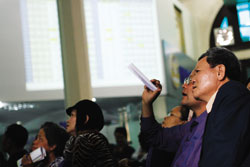Investment funds to put dong under blow torch
The Vietnamese dong will next year feel the heat to appreciate once billion dollar Chinese investment funds begin flooding the country.
 Chinese investment funds are setting sights on local capital market |
“The great wall of Chinese money could be about to arrive,” Evans said in latest HSBC Asia Insights report, adding that there was growing interest from Chinese fund managers in stocks in Korea, Singapore, Australia, Taiwan, India and Vietnam.
The report estimated that China’s overseas portfolio in 2008 could reach $246 billion, of which $153 billion would be poured into various global securities based on its 30 per cent ceiling limit on investment in any one market.
China is now the world’s biggest foreign exchange holder with more than $1,430 billion in reserves, welcoming an additional $30-40 billion per month. While Chinese companies making overseas acquisitions or buying strategic stakes has been common, the fact that Chinese investors are preparing to put money into international securities markets has come as a surprise.
Evans did not reveal the estimated extent of Chinese investment into Vietnam’s capital market next year, but financial analysts said billions of dollars were a certainty as the two countries shared several similarities in economic development planning.
“Chinese investors can use the geographic advantage to practice their investment skills in Vietnam’s capital market,” said Hoang Xuan Quyen, Tan Viet Securities Company’s research director. He added that the energy, banking and property sectors would be attractive to Chinese prospectors.
Quyen said the Chinese stock market was currently overheating, causing its investors to look to overseas markets to diversify risks. Chinese funds, however, were not expected to arrive immediately, he added.
Market analysts have said that Chinese inflows into Vietnam’s securities market next year could have a major impact, leading to stronger gains in the dong that could cause headaches for monetary policy makers.
“Strong foreign portfolio capital inflows brings risks, but also brings rewards,” said Michael Smith, CEO of the Australia and New Zealand Banking Group Limited (ANZ).
In a related development, the Vietnamese Government recently halved its depreciation target for the dong to 0.5 per cent in 2007, half of its goal of a 1 per cent fall by year’s end amid rapid capital inflows, according to an ANZ report.
HSBC economists predicted that Vietnam would allow the dong to appreciate by 0.5 per cent next year and 1 per cent in 2009.
What the stars mean:
★ Poor ★ ★ Promising ★★★ Good ★★★★ Very good ★★★★★ Exceptional
Related Contents
Latest News
More News
- Cashless payments hit 28 times GDP in 2025 (February 04, 2026 | 18:09)
- SSIAM and DBJ launch Japan Vietnam Capital Fund (February 04, 2026 | 15:57)
- Banks target stronger profits, credit growth in 2026 (February 04, 2026 | 15:43)
- Vietnam on path to investment-grade rating (February 03, 2026 | 13:07)
- Consumer finance sector posts sharp profit growth (February 03, 2026 | 13:05)
- Insurance market building the next chapter of protection (February 02, 2026 | 11:16)
- NAB Innovation Centre underscores Vietnam’s appeal for tech investment (January 30, 2026 | 11:16)
- Vietnam strengthens public debt management with World Bank and IMF (January 30, 2026 | 11:00)
- Corporate bond market poised for stronger growth cycle (January 28, 2026 | 17:13)
- Vietnam's IPO market on recovery trajectory (January 28, 2026 | 17:04)

 Tag:
Tag:




















 Mobile Version
Mobile Version